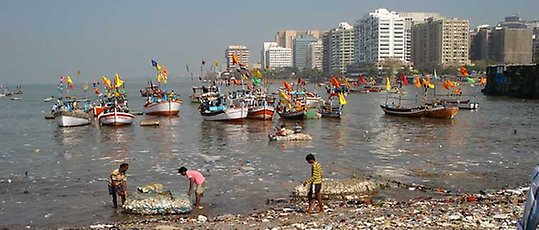Programme coordinator Albert Noström gives a short introduction to the Programme on Ecosystem Change and Society (PECS).
Picking up where the Millennium Assessment left off
New programme to coordinate international research on social-ecological systems

Substantial gains in human well-being and economic development come at a price. The flipside of improved access to food, water and other basic needs has been degradation of many ecosystem services. With the risk of diseases, pests and abrupt changes, the environmental problems make a full circle as they ultimately render livelihoods increasingly vulnerable.
World's first health control
The scientific acknowledgement that people are part of the ecosystems rather than separate from them, has helped remove the perceived dichotomy between nature and society.
One of the most important contributions to the analysis of social and ecological systems was the UN Millennium Ecosystem Assessment (MA), published in 2005. Considered to be the first 'global health control' of the world's ecosystems, the assessment not only revealed that humans have changed Earth's ecosystems faster and more extensively in the past 60 years than ever before, it also revealed significant gaps in scientific knowledge on the links between ecosystem services and human well-being.
Place-based, peculiar and comparative
In an attempt to address these knowledge gaps, the International Council for Science (ICSU), in partnership with the UN Educational, Scientific and Cultural Organization and the UN University, established a new 10 year research programme, the Programme on Ecosystem Change and Society (PECS). The international programme office is hosted by Stockholm Resilience Centre.
"PECS' research will build upon and expand the Millennium Ecosystem Assessment," says PECS coordinator Albert Norström.
PECS will promote place-based case studies of social-ecological systems, addressing the peculiarities of specific landscapes, seascapes or coastal regions.
"To compare the various insights from each place, PECS will examine diverse sources of information and build up a database of case studies and the research questions they attempt to answer," Norström says.
A global network of researchers
PECS will sponsor a wide variety of working groups and workshops to develop a transdisciplinary environment that can boost social-ecological research. Working groups on marine issues, urban landscapes, agro-ecosystems and dryland social-ecological systems have already been proposed. Each working group will include 10-15 researchers from around the world, predominantly younger researchers.
"Ultimately, the success of PECS will depend on the participation of excellent researchers who are motivated to link their research to the PECS network and global change research in general," Albert Norström says.
Related info
For more information about PECS, please contact programme coordinator Albert Norström.






